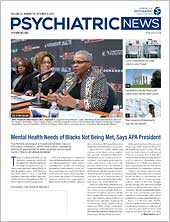Physical exercise improves mental health, according to an analysis of data from more than 1 million people living in the United States published in the September Lancet Psychiatry. The study found that this effect appears to be greater for individuals who have a previous diagnosis of depression than for those who do not.
“The relationship between exercise and physical health is clear—reducing risk of diabetes, stroke, and all-cause mortality—but the relationship with mental health has been less clear,” said lead author Adam Chekroud, Ph.D., an assistant professor of psychiatry at Yale University School of Medicine, in comments to Psychiatric News. “There have been conflicting findings, often because of small or unrepresentative samples. This study has a huge, nationally representative sample size of 1.2 million people across the United States. As a result of the size, we were able to find out a number of novel and important things—that the relationship between exercise and mental health differs as a function of what exercise you do, for how long, and how often.”
The authors analyzed data from the Behavioral Risk Factor Surveillance System, a national telephone survey conducted by the Centers for Disease Control and Prevention between 2011 and 2015. As part of the survey, U.S. adults aged 18 years or older in all 50 states were asked the following question: “During the past month, other than your regular job, did you participate in any physical activities or exercises such as running, calisthenics, golf, gardening, or walking for exercise?”
Participants who answered yes to this question were then asked about the type of physical activity or exercise to which they devoted the most time during the month. A total of 75 types of exercise were represented in the sample, which were grouped into eight exercise categories (aerobic and gym, cycling, household, popular sports, walking, winter and water sports, recreational, and running and jogging).
The researchers measured mental health burden according to the participants’ response to the question, “Thinking about your mental health, which includes stress, depression, and problems with emotions, for how many days during the past 30 days was your mental health not good?”
On average, participants in the study reported 3.4 days of poor mental health per month. Chekroud and colleagues found that those who exercised had 1.49 fewer bad mental health days than those who did not. The effect was more pronounced among individuals who reported a previous depression diagnosis: those with a previous depression diagnosis who exercised had 3.75 fewer bad mental health days than those with a previous diagnosis of depression who did not exercise. The association between exercise and mental health burden was seen across the lifespan, for men and women, across all racial groups, and all levels of household income.
The strongest association between exercise and mental health status was found for team sports, with those who participated in these activities reporting 22.3 percent fewer bad mental health days than those who did not exercise at all. (Team sports included the following: badminton, basketball, canoeing/rowing in competition, frisbee, handball, hockey, lacrosse, racquetball, rugby, soccer, softball/baseball, squash, table tennis, tennis, touch football, and volleyball). Team sports were followed by cycling (21.6 percent reduction in poor mental health days) and aerobic and gym exercises (20.1 percent reduction).
The study also revealed a U-shaped relationship between exercise frequency/duration and mental health burden. People who exercised between three and five times a week or 120 and 360 minutes a week were found to have better mental health than those who exercised less or more each week.
People who exercised more than 23 times per month, or longer than 90 minutes per session, also reported worse mental health. Chekroud speculated that such extreme ranges may reflect factors that are associated with poorer mental health, including obsession with body image, stress, or compulsive behavior. Additionally, extreme amounts of exercise can be fatiguing and can lead to inflammation, which is associated with depression, he said.
He said much of the effect of exercise is biological. But some types of exercise may be influencing mental health in other ways. “Yoga and tai chi work on mindfulness, and team sports have an obvious social component,” he said.
Chekroud, who is co-founder and chief scientist at Spring Health, said he hopes data from the study can be used to tailor an exercise regimen to the particular needs and capacities of an individual patient. “This is something that is especially interesting to us—whether we can use this kind of data to personalize exercise regimens so that we are recommending the most relevant and most helpful regimen to each individual in terms of potential mental health benefit.”
In an editorial accompanying the study in Lancet Psychiatry, Gary Cooney, M.D., of the Department of Psychiatry at the Gartnavel Royal Hospital, in Glasgow, Scotland, cautioned that in using a self-report of good or bad mental health days, the study makes use of an overly broad definition of “mental health” that may not be applicable to individual patients with distinct mental disorders. But he said the enormous size of the study provides a wealth of data that serve as a platform for further, more refined research.
“The overall findings that the strongest positive associations occurred in popular sports, cycling, and aerobic and gym exercise, and that extremes in both frequency and duration of exercise were associated with worse outcomes, provide us with exciting points of departures for further exercise studies,” he wrote. “A study such as this, unprecedented in scale, is to be welcomed in challenging us to design a complementary strand of precision research in the field, to answer questions relating to specific mental disorders and their associations with specific exercise interventions.”
What’s the take-home message for clinicians? “Exercise is quite clearly worthwhile from a physical and mental health perspective,” Chekroud said. “The benefits are quite accessible and might not require extraordinary physical exertion—something like 45 minutes three to five times a week appears to be particularly effective, even if it only involves walking.”
The study was funded in part by the Wellcome Trust. ■
“Association Between Physical Exercise and Mental Health in 1.2 Million Individuals in the USA Between 2011 and 2015: A Cross-Sectional Study” can be accessed
here.

